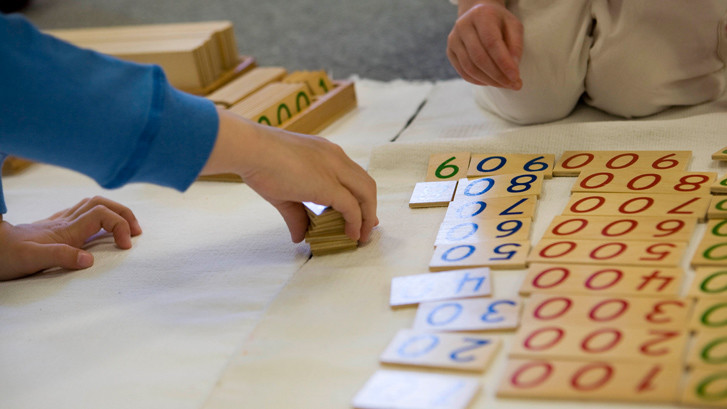What is the difference between a Montessori Program and a Traditional Program?
Many parents who come to visit a Montessori School say that there is just no comparison to other, traditional schools they have visited. We believe that starting your child off in the Montessori environment will have a lifelong impact on your child.
The first thing you may notice upon walking into a Montessori classroom is that the children are not seated at desks. Movement is a key component of the Montessori environment: Children work individually and cooperatively on a variety of lessons, and are encouraged to actively explore the classroom. Montessori children are partners in learning; they are encouraged to teach, collaborate, and help one another.
The three year age range per class allows for special bonds to be formed between the children and their teachers. The younger friends look up to the older friends, learn from them, and dream of the day that they will be the leaders. The older friends model appropriate classroom behavior and the younger friends emulate them. To the casual observer, the Montessori environment may seem unstructured; however, the classroom is comprised of students who are working on highly individualized lessons.
The long-term friendships that are formed in the Montessori environment lead to supportive, collaborative, and trusting relationships. Cliques and bullying are unheard of in the Montessori environment. Grace, courtesy, and conflict resolution are daily parts of the peaceful Montessori curriculum.
A key difference between Montessori and traditional schooling is in the way the staff views their students: Montessori students are viewed holistically, with their cognitive, social, psychological and spiritual development taken into consideration on a daily basis. The Guide truly know each student and recognize and value the individual personalities and gifts that each child brings to the classroom community.
In a Montessori environment, every student is treated with respect. Quiet voices ensure that no one’s work and learning is disrupted.
Montessori students learn at their own pace, and learning is reinforced internally by the child’s repetition of work, and the joy they find in successfully completing their work.
Overall, the main way in which Montessori children differ from traditional students is that Montessori children love to learn. They are excellent
collaborators, problem solvers and time managers. They are innovative thinkers, self-motivated learners and excellent initiators. It is these characteristics which separates Montessori students from traditional students, and leads them to life success.

